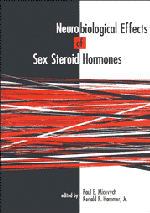Book contents
- Frontmatter
- Contents
- List of contributors
- Dedication
- Preface
- Acknowledgments
- Part I Sex steroid–responsive circuits regulating male and female reproductive behaviors
- Part II Sex steroid interactions with specific neurochemical circuits
- Part III Cellular and molecular mechanisms regulated by sex steroids
- 12 Neurosteroids and neuroactive steroids
- 13 Estrogen synthesis and secretion by the songbird brain
- 14 Neurobiological regulation of hormonal response by progestin and estrogen receptors
- 15 Molecular actions of steroid hormones and their possible relations to reproductive behaviors
- 16 Effects of sex steroids on the central nervous system detected by the study of Fos protein expression
- 17 Developmental interactions of estrogens with neurotrophins and their receptors
- 18 Sex steroid influences on cell–cell interactions in the magnocellular hypothalamoneurohypophyseal system
- Index
17 - Developmental interactions of estrogens with neurotrophins and their receptors
Published online by Cambridge University Press: 15 October 2009
- Frontmatter
- Contents
- List of contributors
- Dedication
- Preface
- Acknowledgments
- Part I Sex steroid–responsive circuits regulating male and female reproductive behaviors
- Part II Sex steroid interactions with specific neurochemical circuits
- Part III Cellular and molecular mechanisms regulated by sex steroids
- 12 Neurosteroids and neuroactive steroids
- 13 Estrogen synthesis and secretion by the songbird brain
- 14 Neurobiological regulation of hormonal response by progestin and estrogen receptors
- 15 Molecular actions of steroid hormones and their possible relations to reproductive behaviors
- 16 Effects of sex steroids on the central nervous system detected by the study of Fos protein expression
- 17 Developmental interactions of estrogens with neurotrophins and their receptors
- 18 Sex steroid influences on cell–cell interactions in the magnocellular hypothalamoneurohypophyseal system
- Index
Summary
Introduction
Appropriate development and maintenance of neurons and their interconnections are fundamental to central nervous system (CNS) function and plasticity in mammals. The molecules that regulate these processes during development as well as in mature neurons are largely unknown and minimally characterized. Two classes of substances implicated in the regulation of development, survival, and neurotransmitter production of neurons in telencephalic regions that subserve learning, memory, and general cognition are estrogen and the family of endogenous growth- and survival-promoting proteins, the neurotrophins, nerve growth factor (NGF), brain-derived neurotrophin factor (BDNF), neurotrophin-3 (NT-3), and neurotrophin-4/5 (NT-4/5).
The organization of neural circuits controlling a broad spectrum of behavioral functions is permanently influenced by exposure of the developing CNS to gonadal steroid hormones: estrogens and androgens. Exposure to these steroids during pre- and postnatal “critical periods” profoundly and permanently influences the organization of the nervous system. The consequences of this hormonal exposure are evident in striking sexual dimorphisms of neuronal structure and function, which underlie the observed sex differences in behaviors, including those related to cognition. The cellular and molecular mechanisms by which gonadal steroids permanently influence the structural and functional organization of the developing brain remain ill-defined, although it seems clear that effects on cellular aspects of neuronal differentiation are likely to be involved (reviewed by Juraska 1991; Toran-Allerand 1991a). Estrogen enhances the growth and differentiation of neurons and their processes (neurites) within the developing hypothalamus, preoptic area, and cerebral cortex in vivo and in vitro (reviewed by Toran-Allerand 1984, 1991b), as well as in steroid target regions of the adult CNS following injury through steroid deprivation, axotomy, or deafferentation (Matsumoto and Arai 1981; Frankfurt et al. 1990).
- Type
- Chapter
- Information
- Neurobiological Effects of Sex Steroid Hormones , pp. 391 - 411Publisher: Cambridge University PressPrint publication year: 1995
- 1
- Cited by



